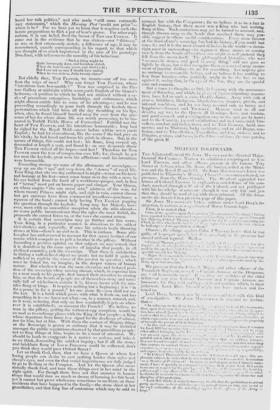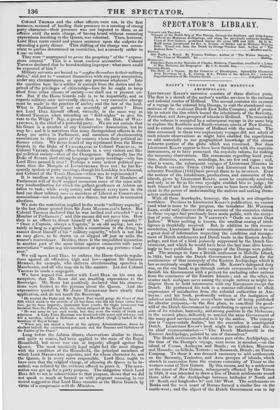MI1,11'.1RI POU'rlCIANS.
THE Adjutrint-Cmeral Sir J.mlmx l'11.tein INA I.1) hii directed Alajor- General Sir CflAIII.ES N tplunt til ailinillistor a reprintand to Co- batel T110MAS, Otllor Officers present at the funous l'ory dinner at Ashton, whea Mr. !limy, the ban'ner, railed at the :Minis- ters ;tinl the [loyal hleIsthill. Sitiotix 1it ‘noos.mo's letter was published in Thursday's 37onnnnn tionon'.4,—as communicated, we presume, from the I torso (netrds. The Snoahoat appended two letters of Colonel 'I'm en ts I I I expla,matioe ;Ind defence of his con- duct, received throng!, a fri'.•nd ix the: Colonel, and not published with his kinnvledge or eons, mmt---though it WaS only fair and just. that they should he read ulong with the reprimand. All the docu- ments are inserted in a pre■ i is page of this paper. Sir JOON 1\1 ttmii,x.iii lot tt W•rit telt 1111dor Jotil IIILL's in- struction, is curious as a si.eeinien of 1 lorse Guards logic. First, it is stated that " one of the se. aches upon that [ILO 01 the dinner] baying; been reported to Mite contained exi.ressioas insulting aml tlisrespectfal towardg her 'Alajesty, Cohn'," 'I'llomas was rc.mired. Ity the Craeral Commanding-in- (hief, to state whether lie had these exprest.-Ion, add it he bad, whetLer lie had exptte,',,,a1 tld-approhatian of them."
Obscrvc, the eharge against Celom.21 s is tint that he was guilty (4, iipproper (1,:t; :(11;10)(111..y ill be presence had.
sinned without repromif Well-
" Colaint Thonnis nnna;r: • •trtl Ci .:pres,;■tis, (as due::
Copia; fn. hims. .-.t:ae 5 lih.Xptsioits
ae(1.1..v the speaker aIItitled to ree".y were, tat to show tlmt their tenour wus re- spoemimil towards her Majt,ly.
•• Maim. 7,1,,.1..;01, ;;11,1 the Regiment who were Azde hit p.mi:ettlar expressions used by AL'.
Ruby upon that ocea.Aon.' "
We pre,zitine that the : 1. it Oil other imfficers of the Twentii.th Regina:lit, as - Clp:;tio issi.i t: of the Dragoons,
are " all honourable nun 2 :1:■• bless of the chief delict--at :illy rate C'o' Tnen5s AINsi.un are
innocent ; for they sIdd ,nni Iaord nothing which, in their
judgment, Lord I'm!. IHnsni 'night not have spoken and lis- tened to.
Li ad Timm., however, as by no mint..., satisfied with this kind of exculpation. Sir Jon): 3l.t000)..11.1, is :Viet:civil to declare, that- " in reference to the ahove it to to observe, that, upon their own showing, Co!: •I ',.11,•:1111:ccl'S ltt tpleS- tion hare placed theinselv.. : ,i! .it-hcirr: obliged to con Ii'-' that tlayh ift lIiIr 1,;.• • . r poret e:twre,rter, at. which expressions were tit ter ,t1 o 1,, •1, e.t.. ,re ,,,jotttre, the propriety of town& the pei,on of their So 'tiii lid: state 1,fa (.2,!,1,11 '_t1/111111, it remains
Mr Lord 11111 hot to etrder .1 t,e 'Lay
other officer belongim, 10 :',,.•
was present upon the • dord-I most
pointed :mit dceided rrant,:, they ore 111,111111. to, m• 14, m.„ that tu Iwo they thus venture to connect Ilion-. and, r any cir- eran.:ta ne: s, and explew themselves to the Is " In Colonel Thomas's tir,1 • r' upon thi4 rm-
loos:ant son,et, li, snites that tn. n• .A.-noviation •
is it ..1!, into'r i'..,r/intnent: In t,1 olonei's state-
ment, I have it specially in co,,,,,, Lord Itill )ields to no one in re,peet Mr the m:' ,,is III. I.ordship
trill tint sajiI r il ffli1' pi. when he thinks tit to resort fit.1.thas' m ,t, I le 11,• charneter and discipline of his profession. " Lord lull thinks it scarcely necessary to add, that tl:e prohibition to offend party meetings, in titter military copneit.g. (except when 011 (Italy Mad in aid ot the civil authorities of the countr,y,) 011.11,s 10 Mt. thc Army at large."
Colonel THOMAS and the other officers were not, in the first instance, accused of lending their presence to a meeting of strong party character—their presence was not imputed to them as an offence until the main charge, of having heard without resenting expressions insulting to the Queen, was rebutted. Then, however, Lord Hum turns round and passes sentence upon the culprits for attending a party dinner. /This shifting of the charge was conve- nient to parties determined on conviction, but extremely unfair to Cose on trial.
They were "unprepared to prove the propriety" of the "expres- sions uttered." This is a most curious accusation. Colonel Tnostas declared that be heard nothing improper: what more could be expected of him ?
- Military servants are bound to "confine themselves to their military duties," and not to "connect themselves with any party association, under any circumstances, or upon any pretence whatever." Into the question how, far a soldier is exempt from the duties and de- prived of the privileges of citizenship—how far he ought to keep aloof from other classes of society—we shall not at present en- ter. But if the Horse Guards rule is to be impartially, and as regards military men universally obeyed, a very extensive change must be made in the practice of society and the law of the land. What is Parliament if' not an assembly of parties ? Does not Lord HILL himself offend, virtually, in the same way as Colonel THOMAS, when attending on " field-nights" to give his vote to the Whigs ? Nay, a greater than he, the Duke of' WEL- LINGTON, is the chief of a powerful party. We are not certain that his Grace is a member of any Conservative Association, but he may be ; and it is notorious that many distinguished officers in the Army are active in Parliament, and members of electioneering associations in those parts of the country where their political in- fluence exists. We never beard of any reprimand from the Horse Guards to the Duke Of CUMBERLAND, or Colonel PsacevAt., or Colonel VERNER, though office-holders in a very violent and ille- gal political society—that of the Orangemen. Repeatedly has the Duke of SUSSEX used strong language at party meetings—why has Lord Hthr. passed it over? Perhaps a more ardent political par- tisan than the Marquis of LONDONDERRY lives not : he has fre- quently spoken at party meetings, though his Lordship is a General, and Colonel of the Tenth Hussars—when was he reprimanded ?
It is needless to multiply instances. The list of Members of Parliament will of itself suggest numerous cases of the same mili- tary insubordination fbr which the gallant gentlemen at Ashton are taken to task; while every county and almost every town in the land can show military men as members of Liberal or Conservative associations—not merely guests at a dinner, but active in contested elections.
We note the restriction implied in the words "military capacity" in the last clause quoted from Sir Joux MACDONALD'S letter. But Colonel THOMAS declared that he was invited and attended" as a Member of Parliament ;" and this excuse did not serve him. How then is an officer to divest himself of his " military capacity ?" " Once a Captain, always a Captain," is an old saying; but cer- tainly as long as a gentleman holds a commission in the Army, he cannot divest himself of his " military capacity," which is not like an easy glove, to be drawn on or slipped off just as suits the wearer's convenience. Besides, there is the unqualified injunction in another part of the same letter against connexion with party associations "under any circumstances or upon any pretence what- ever."
We call upon Lord Ihr.r, to enforce the Horse Guards regula- tions against all offenders, high and low—against Sir GEORGE MURRAY,. for example, who delivers electioneering speeches in Manchester, and all who may sin in like manner. Let not Colonel Turmas be made a scapegoat. We have argued this matter with Lord Hui. on his own as- sumption, that Mr. Roily did use insulting expressions to the Sovereign. Mr. ROBY has positively declared that his observa- tions were limited to the persons about the Queen. And the expressions quoted by Sir JOHN MACDONALD have clearly that application, and do not touch the Sovereign.
"He trusted the Duke and Sir Robert Peel would purge the Court of that filth ivhich stank in the nostrils of all but those who did not know virtue from vice, pirity from impurity, innocence from youth; for virgin innocence was banished from the Palace, while vice rioted rampant at the Royal board.
" He was sorry to use such words, but they were the words of truth and soberness. A Lady Flora Hastings was dismissed with scorn and obloquy, and fell a sacrifice, whilst a Melbourne and a Headfort (faugh !) basked in the sunshine of Royal favour. "When any one aimed a blow at the epicure Administration, down he skulked behind the embroidered petticoats and the flounces and furbelows of the Ladies of the Court."
Long before the Ashton dinner, observations similar to these, and quite as coarse, had been applied to the state of the Royal Household, but never was vice or impurity alleged against the Queen. The most sensitively loyal might feel the most disgust with the condition of the Household, the principal members of which Lord MELBOURNE appoints, and for whose character he, not the Queen, is in every sense responsible. Lord IImr, ought to have seen that the original charge, of allowing 11w Queen to be in- sulted, was refuted by the evidence offered to prove it. The accu- sation was got up for a party purpose. The obligation which Lord HILL felt to act in subservience to that purpose, shows that we did not speak so much at hazard as with pregnant meaning, in our recent suggestion that Lord HILL remains at the Horse Guards by virtue of a compromise with the Ministers.



























 Previous page
Previous page